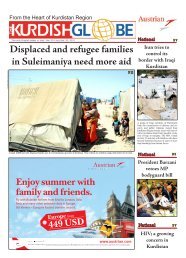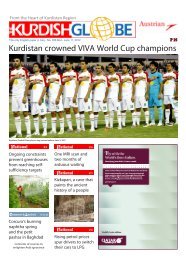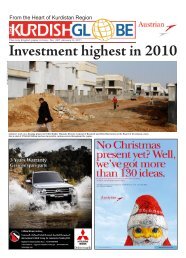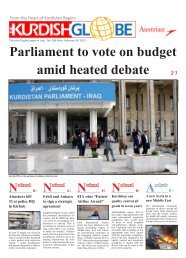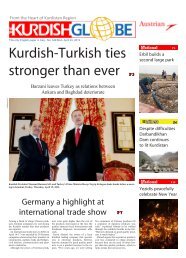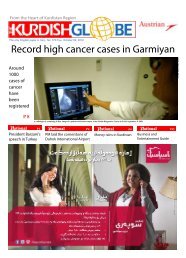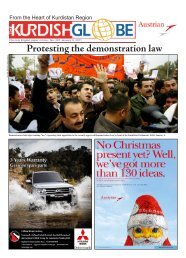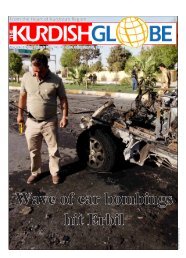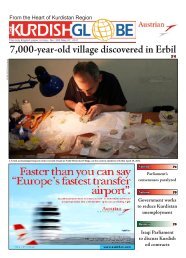Erbil: The host city of sports t ournaments - Kurdish Globe
Erbil: The host city of sports t ournaments - Kurdish Globe
Erbil: The host city of sports t ournaments - Kurdish Globe
You also want an ePaper? Increase the reach of your titles
YUMPU automatically turns print PDFs into web optimized ePapers that Google loves.
<strong>The</strong> <strong>Kurdish</strong> <strong>Globe</strong> No. 276, Saturday, October 09, 2010 6<br />
Rosary sales continue under cardboard shade<br />
Lean-to’s serve as cover<br />
for sellers <strong>of</strong> prayer beads<br />
With the<br />
temporary closure <strong>of</strong><br />
Suleimaniya’s Great<br />
Mosque, rosary<br />
vendors take to the<br />
opposite side <strong>of</strong> the<br />
street to hawk their<br />
wares.<br />
After the demolition <strong>of</strong> the<br />
outside walls <strong>of</strong> the Great<br />
Mosque for renovation purpe<br />
poses, rosary sellers in Sule<br />
leimaniya have built small<br />
huts on the adjacent street<br />
curb near the mosque to<br />
keep their businesses goie<br />
ing.<br />
Normally the sellers stand<br />
near the main gate <strong>of</strong> the<br />
mosque holding rosaries or<br />
scattering them on a sheet<br />
on the sidewalk. But since<br />
the start <strong>of</strong> renovation, the<br />
mosque has been sealed <strong>of</strong>f<br />
with corrugated-iron barrie<br />
ers, forcing rosary sellers to<br />
do their selling elsewhere.<br />
Centered in Suleimaniye<br />
ya’s <strong>city</strong> center, the Great<br />
Mosque--the oldest mosque<br />
in the <strong>city</strong>--welcomes thouse<br />
sands <strong>of</strong> visitors daily.<br />
Renovation is scheduled<br />
for completion in June<br />
2011, which is when the<br />
mosque is expected to reoe<br />
open. “We do not sell as<br />
much as we used to. Some<br />
<strong>of</strong> our customers were tourie<br />
ists visiting the shrines in<br />
the mosque,” said Karim<br />
Penjweni, 80, selling rosare<br />
ries under a small hut.<br />
Sharif Mahmud, 70, has<br />
been in the business for<br />
about eight years. His hut,<br />
he said, “does not protect<br />
me from hot or cold weathe<br />
er…neither does it protect<br />
me from dust on the street.”<br />
His hut was just a little<br />
more than a square meter<br />
long and a meter high, built<br />
<strong>of</strong> cardboard tightened to<br />
the street barrier on one<br />
side and the corrugated<br />
iron barriers behind him on<br />
the other side, covered with<br />
plastic sheeting.<br />
“Now people cannot wait<br />
too long to see what we have<br />
for sale. We were doing<br />
better when we were standie<br />
ing free, near the gate <strong>of</strong> the<br />
mosque,” added Mahmood.<br />
He explained that because<br />
<strong>of</strong> the location <strong>of</strong> the huts<br />
right on the street, where<br />
lots <strong>of</strong> cars and push-carts<br />
pass by, people don’t stand<br />
GLOBE PHOTO/Salam Abdulqadir<br />
An elderly rosary vendor relaxes in his workplace in downtown Suleimaniya.<br />
around and browse as long<br />
as they used to.<br />
“Sometimes cars park too<br />
close to us. We get their<br />
heat; it is so infuriating,” he<br />
noted.<br />
Penjweni complained<br />
about his space as well,<br />
saying he feels “uneasy”<br />
under his cardboard. He<br />
mentioned that business has<br />
declined since he moved<br />
his location.<br />
Mahmud mentioned that<br />
sometimes he sells no more<br />
than two rosaries a day.<br />
“<strong>The</strong> money I make from<br />
this is not enough to even<br />
buy my water.” Like many<br />
other people in the market,<br />
Mahmud buys bottled wate<br />
ter for drinking.<br />
Playing with rosary, or<br />
prayer beads, while speakie<br />
ing, sitting, or walking is<br />
common among Kurds.<br />
Even leaders are seen somete<br />
times in press conferences<br />
with prayer beads in their<br />
hands. Young people wear<br />
the beads on their necks for<br />
beauty. Mahmud said that<br />
women <strong>of</strong>ten visit, looking<br />
for nice rosaries.<br />
Originally, prayer beads<br />
were--and are still--used<br />
for counting prayers. Musle<br />
lims mention the name <strong>of</strong><br />
God and praise him with a<br />
number <strong>of</strong> prayers, using<br />
beads instead <strong>of</strong> fingers to<br />
count them. A normal rosare<br />
ry has 101 beads. But there<br />
are longer and shorter ones.<br />
<strong>The</strong> number comes from an<br />
Islamic tradition that a singe<br />
gle prayer is to be repeated<br />
a hundred times. <strong>The</strong>re are<br />
five main prayers, and thus<br />
a reciter finishes one prayer<br />
by completing a round.<br />
Rosaries range from<br />
US$2 to around US$100<br />
in Suleimaniya. <strong>The</strong> price<br />
is determined by the rarene<br />
ness, quality, and beauty<br />
<strong>of</strong> the beads. And they are<br />
homemade. “We buy rosare<br />
ries made in different areas<br />
in Kurdistan like Qaradagh,<br />
and then we sell them rete<br />
tail,” Penjweni said. Under<br />
his hut, Mahmud rested<br />
his back on a pile <strong>of</strong> little<br />
sacks, saying he is fine with<br />
business the way it is. “God<br />
will not let me down.”<br />
Salam<br />
Abdulqadir<br />
Suleimaniya<br />
salam.abdulrahm<br />
man@gmail.com<br />
GLOBE PHOTO/Duraid Salman<br />
Boys collect recyclables from garbage in a Baghdad neighborhood.<br />
Toxic reactions<br />
and other consumer<br />
health issues are<br />
results <strong>of</strong> household<br />
products made<br />
from Baghdad’s<br />
recycled garbage.<br />
Children and youths note<br />
ticeably move in between<br />
garbage piles in Baghdad<br />
<strong>city</strong>, picking up recyclable<br />
metals and plastics to sell<br />
to factories. With the help<br />
<strong>of</strong> his donkey and carriage<br />
loaded with bags filled<br />
with metal cans, Wisam<br />
Hassan, 21, sifts through<br />
several garbage places eve<br />
ery day. He holds a stick<br />
with which he turns over<br />
trash, seeking cans and<br />
anything made <strong>of</strong> copper,<br />
aluminum, or plastic.<br />
“I owe my faithful donke<br />
key. Without it I would be<br />
exhausted. And it never<br />
complains,” said Hassan,<br />
waving his hand to swat<br />
away mosquitoes. “This<br />
is the source <strong>of</strong> my living<br />
and I cannot find a better<br />
job” because <strong>of</strong> lack <strong>of</strong> job<br />
opportunities in the <strong>city</strong><br />
and he knows no pr<strong>of</strong>esse<br />
sion, said Hassan.<br />
But he can earn 15,000<br />
to 40,000 Iraqi dinars depe<br />
pending on the quantity<br />
<strong>of</strong> the collected metals.<br />
Many people have taken<br />
to doing this job. On the<br />
same garbage Hassan<br />
was searching, a boy <strong>of</strong><br />
about 10 looked happy as<br />
Living on garbage<br />
Factories in Baghdad produce unhealthy<br />
materials recycled from trash<br />
he carted <strong>of</strong>f a car radiate<br />
tor (part <strong>of</strong> which is coppe<br />
per) he found. “This looks<br />
heavy. It sells well and is<br />
copper,” shouted the boy.<br />
Thanks to the garbage<br />
seekers, recycling has also<br />
been revived. Factories<br />
locally known as Kurat<br />
receive recyclable trash<br />
to dissolve and turn into<br />
plastic bags, pots, among<br />
other things. But the proce<br />
cess <strong>of</strong> collecting, dissolvie<br />
ing, and remaking continue<br />
uously circles away from<br />
sanitary observations.<br />
<strong>The</strong> products <strong>of</strong> the small<br />
factory, which depend on<br />
trash as raw material, are<br />
dangerous to consumer<br />
health, commented Dr.<br />
As’ad Sameer, from Baghde<br />
dad. <strong>The</strong> plastic products<br />
stink and the metal pots<br />
change color because<br />
<strong>of</strong> oxidation operations.<br />
Ahmed Muhan, a chemiste<br />
try expert, warns that such<br />
products either must pass<br />
through necessary tests for<br />
quality control or they will<br />
cause toxicities. “Recyce<br />
cling metal never should<br />
be done in a random ope<br />
eration. Many <strong>of</strong> such<br />
products have the ability<br />
to interact with foods that<br />
are acidic…then they will<br />
become like time bombs<br />
in consumers’ stomachs,”<br />
Muhan explained. Plastic<br />
bags made out <strong>of</strong> recycled<br />
plastic are easy examples<br />
to test, he added. For exae<br />
ample, by putting hot<br />
bread in such a bag, it can<br />
cause melting <strong>of</strong> the nylon<br />
and toxic materials are<br />
then emitted.<br />
But owners <strong>of</strong> the recyce<br />
cling factories defy the<br />
warning and defend their<br />
products as clean. Sales<br />
are good and complaints<br />
are few, they say. <strong>The</strong>y<br />
also deny using trash as<br />
raw material. Qais Faisal<br />
owns a factory that makes<br />
plastic and aluminum<br />
products in Baghdad.<br />
<strong>The</strong>y import raw material<br />
and aluminum plates for<br />
their factory and somete<br />
times mix them with rece<br />
cycled materials so as to<br />
sell them cheaper. <strong>The</strong><br />
local products are “excelle<br />
lent and better quality than<br />
the imported ones,” said<br />
Muneer Qassim, praising<br />
his own factory.<br />
Salman Haitham has his<br />
doubts, however. “Where<br />
does all the material<br />
picked up from the trash<br />
go to?” he asked, questionie<br />
ing the supposed healthy<br />
conditions <strong>of</strong> local produe<br />
ucts. Based on a doctor’s<br />
advice, Haitham recently<br />
decided to change all the<br />
pots in his house after<br />
one <strong>of</strong> his children tested<br />
positive for toxins. He expe<br />
plained that the pots in his<br />
house had turned black.<br />
Duraid Salman<br />
Baghdad<br />
duraedabrahem<br />
@yahoo.com



